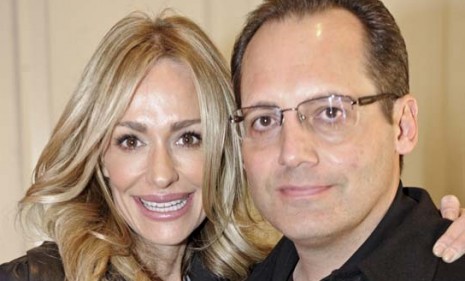Real Housewives suicide: Has reality TV become dangerous?
After tragedy strikes the family of a Bravo TV reality star, critics debate whether the genre's cynically exploitative nature has become truly harmful

A free daily email with the biggest news stories of the day – and the best features from TheWeek.com
You are now subscribed
Your newsletter sign-up was successful
The suicide earlier this week of Russell Armstrong, the husband of one of The Real Housewives of Beverly Hills, is shining a spotlight on the pitfalls of reality TV. Armstrong made frequent appearances on the Bravo series, which chronicled his disintegrating marriage and financial troubles, and he had gone on record calling his experience overwhelming. Just before his death, he allegedly voiced concerns that the upcoming season "was going to crucify" him. The tragedy follows reports that reality-TV notoriety has left former The Hills stars Spencer Pratt and Heidi Montag broke, friendless, and unemployable — and the ugly chorus of schadenfreude that greeted the cancellation of oft-vilified Kate Gosselin's reality series, Kate Plus 8. Has reality TV become an "emotional blood sport" that's harming its participants?
Things are getting too real: Now that the normally diverting The Real Housewives of Beverly Hills must grapple with how to portray the aftermath of Armstrong's suicide on TV, says James Poniewozik at TIME, the future of the show is in jeopardy. Viewers are accustomed to watching reality stars suffer heartbreak, disappointment, and confusion in the name of entertainment — but knowing that their enjoyment of those pressures may have led to Armstrong's death could be too much to take. "It doesn't speak well of a reality show that the thing that could push it off the air is, well, reality."
"Real Housewives suicide: Show in doubt after death"
The Week
Escape your echo chamber. Get the facts behind the news, plus analysis from multiple perspectives.

Sign up for The Week's Free Newsletters
From our morning news briefing to a weekly Good News Newsletter, get the best of The Week delivered directly to your inbox.
From our morning news briefing to a weekly Good News Newsletter, get the best of The Week delivered directly to your inbox.
The genre has to change: Reality stars are like gladiators who use psychological warfare instead of spears and clubs, says Matt Zoller Seitz at Salon. Participants "suffer and bleed emotionally while we watch and guffaw." If this "spectacle of emotional violence" must continue, we need to better equip reality stars to handle the coliseum. The shows should employ a more rigid psychological pre-screening process, and have therapists on call at all times to monitor the emotional toll on participants.
"Reality TV: A blood sport that must change"
Everyone is overreacting: While the pressures of appearing on reality TV may have exacerbated Russell Armstrong's psychological problems, charges that the genre has become dangerous are hyperbolic, says Robert Morast at In Forum. This is merely a case of "reality TV haters exploiting a timely reason to condemn something they don't like." Armstrong's "own demons and dilemmas" were far more influential in his life than reality TV.
"Don't overreact: Reality TV is not killing people"
A free daily email with the biggest news stories of the day – and the best features from TheWeek.com
-
 5 cinematic cartoons about Bezos betting big on 'Melania'
5 cinematic cartoons about Bezos betting big on 'Melania'Cartoons Artists take on a girlboss, a fetching newspaper, and more
-
 The fall of the generals: China’s military purge
The fall of the generals: China’s military purgeIn the Spotlight Xi Jinping’s extraordinary removal of senior general proves that no-one is safe from anti-corruption drive that has investigated millions
-
 Why the Gorton and Denton by-election is a ‘Frankenstein’s monster’
Why the Gorton and Denton by-election is a ‘Frankenstein’s monster’Talking Point Reform and the Greens have the Labour seat in their sights, but the constituency’s complex demographics make messaging tricky